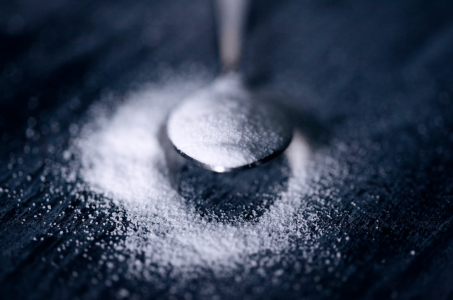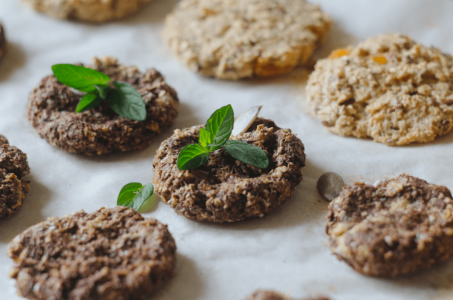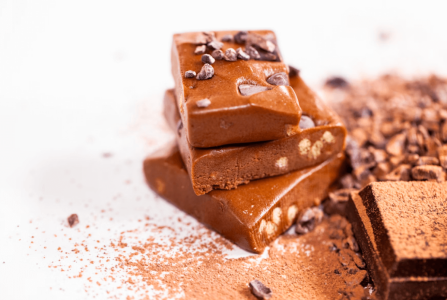The bittersweet truth about a common sugar substitute, erythritol: Is it as safe as we thought?
- Replies 11
We've all been there - trying to live a healthier lifestyle but still craving our favourite sweet treats. It's no surprise that many of us have swapped sugar for low-calorie sweeteners, thinking we're making a smart choice.
But what if we told you that this seemingly harmless alternative could lead to health risks such as blood clots, heart attack, and even strokes?
According to a recent study, a popular sugar alternative could be doing more harm than good. So before you reach for that sweetener packet or dump it in your morning cuppa, you might want to think twice - your health could be on the line!
A recent study published in the journal Nature Medicine revealed that people with diabetes were twice as likely to suffer a heart attack or stroke if they had high levels of erythritol in their blood.

What is erythritol?
You might be familiar with artificial sweeteners like aspartame and sucralose (more commonly known as Splenda), but have you heard of erythritol? This zero-calorie sweetener is a game-changer in the world of low-calorie products.
But what exactly is it? Here, let us explain.
First things first: erythritol is a type of polyol, also known as sugar alcohol. (Don't worry, it's not actual alcohol — unless you count the buzz you'll get from all the flavour!)
Unlike other sweeteners that are sweeter than sugar, erythritol is only about 60% to 80% as sweet. This means it can be used in larger quantities to add bulk to low-calorie products.
But the best part? Erythritol is a 'non-nutritive' sweetener, which means your body won't digest it like regular sugar. So, you can indulge in your favourite sweet treats without worrying about your waistline.
Now, you might be thinking, 'Wait, what about stevia and monk fruit extract?' While these sweeteners also have similar properties, they're made from plant extracts, making them a bit different from erythritol.

If you're wondering where you can find erythritol, the answer might surprise you. While it might not be as well-known as other sweeteners, erythritol is actually quite common.
You'll often find it mixed with other artificial sweeteners to create low-calorie products with more volume. For example, packets of Splenda stevia sweetener contain a mix of a little bit of stevia extract and the rest is erythritol to fill out the package.
But that's not all. Erythritol can also be found in a variety of low-calorie foods like protein bars, low-calorie spreads, and certain peanut butters. And if you're on a keto diet, keep an eye out for erythritol in desserts, antioxidant drinks, and snacks that are marketed for your lifestyle.
While erythritol is found naturally in fruits and is even made by our own bodies, the concern is about the larger amounts that are used in sweeteners.
The researchers found that eating just 30 grams of erythritol (roughly the amount in a half a litre of low-calorie ice cream) raises blood levels of erythritol by a factor of 1,000. Even though those levels begin to drop within a few hours, they can remain well above normal levels for at least two days after consuming the sweet treat.

So, should I just avoid all food items containing erythritol?
The short answer is, maybe. The study found that people with higher levels of erythritol in their blood were more likely to have heart attacks or strokes. Yikes! But before you toss out all your favourite low-sugar snacks, there are a few things you should know.
First of all, the study doesn't mean you need to ditch erythritol altogether. But it might be worth keeping an eye on future research to see if more studies confirm these findings. In the meantime, if you're feeling cautious, you could try cutting back on your erythritol intake a bit.
Another thing that's especially concerning is that a lot of foods containing erythritol are marketed to people who are already at risk of thrombosis (blood clotting). Think about it: if you're trying to lose weight or manage your diabetes, you're probably more likely to reach for low-sugar snacks!
According to Dr Stanley Hazen, lead author of the study, erythritol seems to make our blood unusually sensitive to the signals that tell it to clot. Unlike sugar, our bodies don't break it down, so it just kind of floats around in our bloodstream until we go to the bathroom. And while clotting is a normal function of our blood, it seems like erythritol can make things a little too sensitive.
In conclusion, the jury is still out on whether erythritol is really as dangerous as this study suggests. But if you're someone who eats a lot of low-sugar snacks or drinks that contain the ingredient, it might be worth considering cutting back. After all, better safe than sorry, right?
To know more about erythritol and other artificial sweeteners, check out this video below:
Credit: Dr Eric Berg DC.
So what do you think of this news, members? Are you regularly consuming low-calorie foods and sugar alternatives? If so, you might want to keep an eye on future research about erythritol and other sugar substitutes.
And if you're feeling concerned, it's always a good idea to talk to your doctor about your diet and health.
We hope you found this article helpful and informative! At the end of the day, it's up to you to make the best choices for your health and well-being. But with a little bit of knowledge and caution, you can continue enjoying your favourite low-sugar snacks and drinks without worrying too much about the risks.
But what if we told you that this seemingly harmless alternative could lead to health risks such as blood clots, heart attack, and even strokes?
According to a recent study, a popular sugar alternative could be doing more harm than good. So before you reach for that sweetener packet or dump it in your morning cuppa, you might want to think twice - your health could be on the line!
A recent study published in the journal Nature Medicine revealed that people with diabetes were twice as likely to suffer a heart attack or stroke if they had high levels of erythritol in their blood.

A new study has revealed something concerning about a commonly used sugar alternative called erythritol. Credit: Unsplash/Alexander Grey.
What is erythritol?
You might be familiar with artificial sweeteners like aspartame and sucralose (more commonly known as Splenda), but have you heard of erythritol? This zero-calorie sweetener is a game-changer in the world of low-calorie products.
But what exactly is it? Here, let us explain.
First things first: erythritol is a type of polyol, also known as sugar alcohol. (Don't worry, it's not actual alcohol — unless you count the buzz you'll get from all the flavour!)
Unlike other sweeteners that are sweeter than sugar, erythritol is only about 60% to 80% as sweet. This means it can be used in larger quantities to add bulk to low-calorie products.
But the best part? Erythritol is a 'non-nutritive' sweetener, which means your body won't digest it like regular sugar. So, you can indulge in your favourite sweet treats without worrying about your waistline.
Now, you might be thinking, 'Wait, what about stevia and monk fruit extract?' While these sweeteners also have similar properties, they're made from plant extracts, making them a bit different from erythritol.

Erythritol looks like sugar, it tastes like sugar, and you can bake with it. Credit: Unsplash/Olga Nayda.
If you're wondering where you can find erythritol, the answer might surprise you. While it might not be as well-known as other sweeteners, erythritol is actually quite common.
You'll often find it mixed with other artificial sweeteners to create low-calorie products with more volume. For example, packets of Splenda stevia sweetener contain a mix of a little bit of stevia extract and the rest is erythritol to fill out the package.
But that's not all. Erythritol can also be found in a variety of low-calorie foods like protein bars, low-calorie spreads, and certain peanut butters. And if you're on a keto diet, keep an eye out for erythritol in desserts, antioxidant drinks, and snacks that are marketed for your lifestyle.
While erythritol is found naturally in fruits and is even made by our own bodies, the concern is about the larger amounts that are used in sweeteners.
The researchers found that eating just 30 grams of erythritol (roughly the amount in a half a litre of low-calorie ice cream) raises blood levels of erythritol by a factor of 1,000. Even though those levels begin to drop within a few hours, they can remain well above normal levels for at least two days after consuming the sweet treat.

Erythritol is commonly found in a variety of low-calorie foods like protein bars, low-calorie spreads, and peanut butter. Credit: Unsplash/Nature Zen.
So, should I just avoid all food items containing erythritol?
The short answer is, maybe. The study found that people with higher levels of erythritol in their blood were more likely to have heart attacks or strokes. Yikes! But before you toss out all your favourite low-sugar snacks, there are a few things you should know.
First of all, the study doesn't mean you need to ditch erythritol altogether. But it might be worth keeping an eye on future research to see if more studies confirm these findings. In the meantime, if you're feeling cautious, you could try cutting back on your erythritol intake a bit.
Another thing that's especially concerning is that a lot of foods containing erythritol are marketed to people who are already at risk of thrombosis (blood clotting). Think about it: if you're trying to lose weight or manage your diabetes, you're probably more likely to reach for low-sugar snacks!
According to Dr Stanley Hazen, lead author of the study, erythritol seems to make our blood unusually sensitive to the signals that tell it to clot. Unlike sugar, our bodies don't break it down, so it just kind of floats around in our bloodstream until we go to the bathroom. And while clotting is a normal function of our blood, it seems like erythritol can make things a little too sensitive.
In conclusion, the jury is still out on whether erythritol is really as dangerous as this study suggests. But if you're someone who eats a lot of low-sugar snacks or drinks that contain the ingredient, it might be worth considering cutting back. After all, better safe than sorry, right?
To know more about erythritol and other artificial sweeteners, check out this video below:
Credit: Dr Eric Berg DC.
So what do you think of this news, members? Are you regularly consuming low-calorie foods and sugar alternatives? If so, you might want to keep an eye on future research about erythritol and other sugar substitutes.
And if you're feeling concerned, it's always a good idea to talk to your doctor about your diet and health.
We hope you found this article helpful and informative! At the end of the day, it's up to you to make the best choices for your health and well-being. But with a little bit of knowledge and caution, you can continue enjoying your favourite low-sugar snacks and drinks without worrying too much about the risks.







